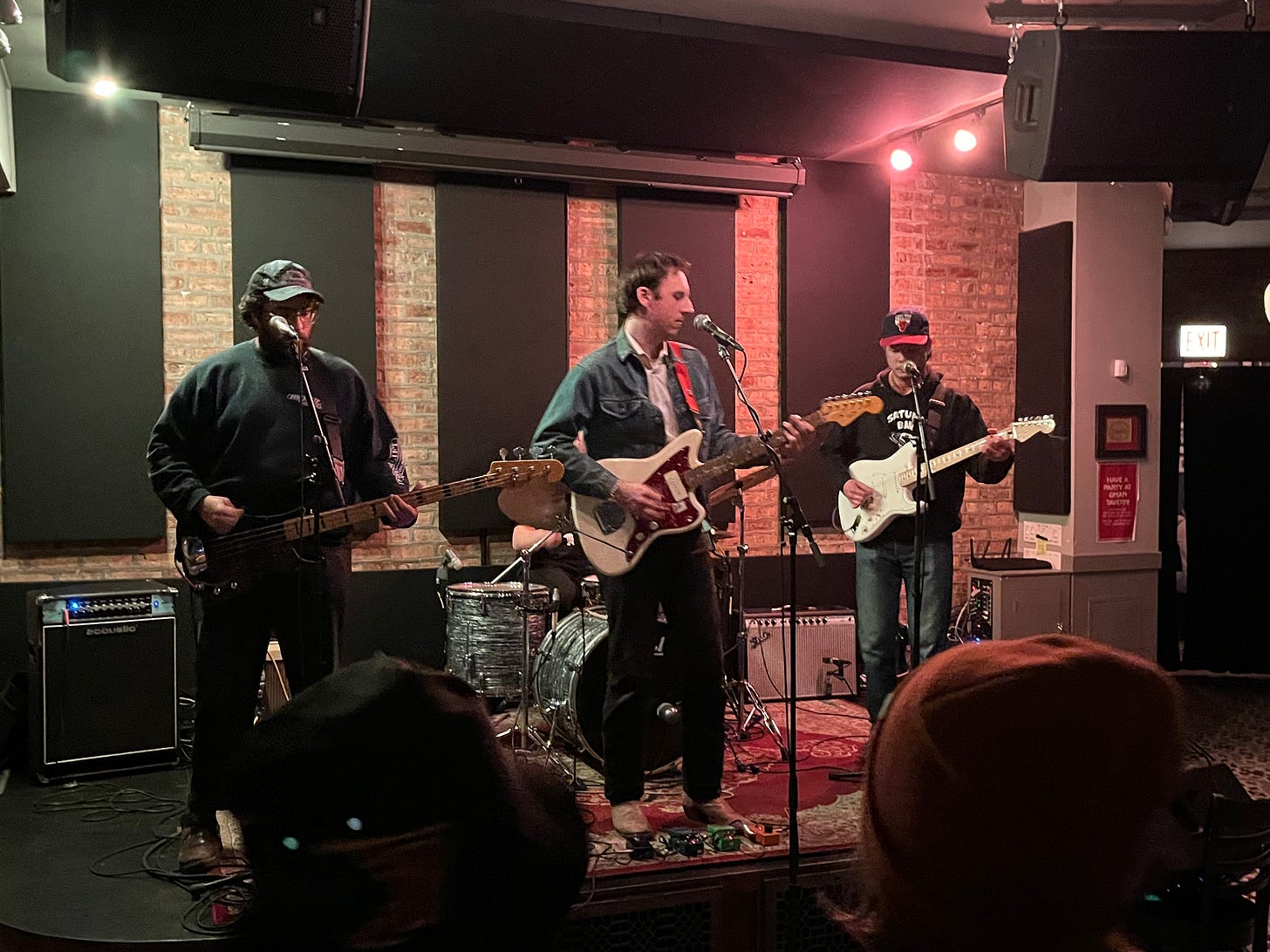Crow’s Nest 80: 020225
Is it too late to pivot to a standardized subheadline format for this publication
Hello folks, and welcome to issue #80 of Crow’s Nest. You survived January, somehow, and that ain’t nothing at this point, so congratulations! And thank you for opening this and reading it. Let’s get to it.
Sometimes writing parts of this newsletter in advance can backfire. Having written some of the below before the weekend after getting invited to the dive bar I play trivia at’s secret customer appreciation event, I felt confident that my first writeup, softly my top pick for the issue, was set by Wednesday. Then, heading to a Friday doctor’s appointment, France drops a new one out of the blue. If you remember Do Den Haag Church from a few issues back, the hurdy-gurdy drone trio haven’t changed their formula. But here the group sound like a snarling, thrashing beast barely held back by a leash tied to a stake, instead of mystics in trancelike ecstasy. The most obvious comparison here is Water Damage, or The Dead C in longform. You know what to do with this one.
Most dedicated Chicago showgoers who like loud guitars have probably seen Heet Deth before—I’ve caught them 3 times per my notes—whether or not they’ve actively intended to. They’ve been a pretty good 2-person act that help fill up bills, with a strong post-apocalyptic visual aesthetic equally at home in small venues as at junkyard parties. (Among many competitors in contemporary post-punkish, they most strongly radiate theater kid energy, by no means a bad thing.) I write the above in the past tense, as their new album is a massive level up and ought to set them on the path to fully realizing their visions. The songs are explosive and punchy, sidestepping some of the worst tendencies of guitar-and-drums groups: namely, overly didactic lyricism and indiscriminately targeted raised middle fingers. If you’ve needed an outlet for anger because of [straining my shoulders to gesture so broadly] or are wondering where other peoples’ anger is right now, look no further. And if you have any connections to George Miller, put in a good word for these ladies; they deserve to be cast in the next Mad Max movie.
Dance music aficionados a smidge older than me hold Jan Jelinek in high regard, but I’ve never fully gotten his turn of the millennium era click-and-cuts experimentalism. I decided against catching him at Constellation last year since I wasn’t sure what kind of show he’d put on, but a few of my sources for music highlighted this reissue of 2005’s Kosmischer Pitch a couple weeks ago, and I think I’m starting to get it. Turning his sampling to the referenced genre, the results are perhaps a bit too woozy for either sci-fi film soundtracks or the dancefloor, but remain a deliriously good time in that artfully German manner.
I’d like to think my taste in music is fairly expansive, and I’m sure you, the person reading this, might be inclined to agree, but I know my blind spots. Jazz funk is one of them, and while I consider Cortex performing Troupeau Bleu one of the best shows I saw last year, getting into their discography beyond that has been a bit intimidating, as it is in for any artist or genre where the hidden gems surely far outnumber even a rich top-tier. Case in point: someone on Bluesky posted about this 6-album box set from UK group Brian Auger’s Oblivion Express. I probably couldn’t describe it in much detail without learning music theory or knowing how to write about jazz, but if you’re not familiar, diving in to their work here (and beyond, if desired) is well worth it.
Whenever I hear someone mention salsa music in the present, I can never tell whether they mean something close to the old-school sound, or some contemporary offshoot genre purists might scoff at, like when big room EDM DJs start talking deep house. Anyway, I won’t pretend like Tito Puente is a name I knew anything about before listening to this compilation of records the bandleader and timbale player made while signed to RCA. What I can say is that the sound quality here is phenomenal, and in many ways is much better than contemporary material compressed to an inch of its life for a million pounds of bass. They’ve got way more punch than anything I would expect from recordings dating back to the Truman administration. Whether you’re a lifelong salsa dancer, barely know a word of Spanish, or, like me, are structurally wired to dance in 6 instead of 4, this collection is worth your time.
One consequence of flooding the zone—indeed, its purpose—is that many things properly worth consideration and attention get lost in the deluge. This is a problem politically, as I’m sure you’re aware right now, and to a lesser extent in music listening; one of the purposes of this newsletter is to help remedy that, to the extent I’m able to. Even then, I am also subject to the phenomena I observe, as the ever-increasing number of unopened emails from Bandcamp and others attests. Anyway, I’m not quite sure when/how I started following 180g, which I believe is a Japanese-French operation specializing in archival Japanese jazz and Brazilian reissues, but one of the records they’ve (re-)spotlighted is this 1968 album fusing bossa nova with big band jazz, performed with traditional Japanese instruments in the arrangements. Whatever trauma I inherited from doing jazz euphonium in middle school prejudices you may have against any of the constituent components, it’s a fairly unique affair afaik, and overall an exquisite listen well worth your time all these years later.
I’ve followed Celia Hollander’s work for a while—I distinctly recall procrastinating on studying for a freshman year final by digging around on one of her websites when she went by $3.33—and it always maintains an intriguing, nebulous sense of mystery to it. On her latest album, the Los Angeles-based artist takes her experimental ambient tendencies towards the outside world, creating a recombinant series of miniatures exploring natural phenomena. It’s New Age-y at times but frequently grounded in beats, and even gets close to dance-y at certain points. I’m reminded a lot of Kate NV’s instrumentals here, thrown into a blender; the MIDI horn pieces in the album such as ‘Earth / Fire’ are particular highlights.
Being the second band to release on kranky, Jessamine get more than their fair share of coverage in You’re With Stupid. Despite really enjoying that book, I did not get around to listening to them until this Bandcamp Daily primer on 90s Cascadian psych because … well, I assembled a playlist of stuff to listen to that sounded intriguing from the book, and I thought I’d have time during my trip to Japan to listen but didn’t, and the onslaught of other music I felt like checking out first never relented enough nor did I make time to listen to all that, partially because I then got caught up in listening through the Making Time playlists to figure out who to catch there and and …
Long story short, despite every indication that I ought to listen to them, I didn’t until these past few weeks, which was a mistake. If contemporary kranky leans ambient and shoegaze, Jessamine’s self-titled debut feels like a curveball or definitely what a label still finding its footing would put out. Somewhere in the space rock/krautrock/noise pop realm, it very much sounds like you’d expect a 90s Seattle band resisting the siren call to copy their neighbors all the way to the bank might make. Emperor Tomato Ketchup has always been my favorite Stereolab record, and while I haven’t revisited the earlier LPs from them to determine if they’re a more proper comparative point, especially given Jessamine’s centering of Farfisa organ fuzz for leads here which isn’t necessarily the backbone there … perhaps I should give those a spin again … ugh.
Melbournian post-punks Delivery are back with their second record following standout debut Forever Giving Handshakes. They’re not reinventing their sound here, the same power jangle and quotidian politicization of contemporary life abound, but it’s by no means a bad thing, especially as I’ve been lacking a new art-y guitar record to obsess over recently. Nothing wrong with getting exactly what the customer ordered.
Toulouse Low Trax is definitely one of those names that’s been on my radar for forever, but has never left a strong impression on me. That’s partially a result of the name here seeming like it has a different meaning than it does. The Düsseldorf-based musician released this long EP or short LP through anything goes label TAL, and the tracks inside feel dusty, a little haphazard and more than their fair share of haggard. Suitable for a grimy affair for sure.
And with that, I’ve completed 80 issues of Crow’s Nest. Like the 79 times before (and however many more to come), thank you for getting down to this part, hopefully something above made it worth your while. Keep going on with whatever is is you’re dealing with at this time.






